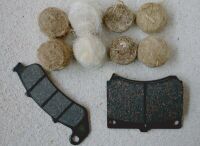Brake pads can now be made more sustainably using renewable crops, as research in Great Britain has shown how natural fibre such as hemp can replace costly aramid fibre with no loss of performance and less impact on the environment.
 Brake pads are one of the key components in the race to develop greener transport, with 80 million sets used in the UK every year. Since the use of asbestos was phased out in the 1980s, most have been formulated using man-made aramid fibres. They also incorporate significant amounts of heavy metal compounds. Around 20,000 tonnes of dust containing these materials are discharged into the environment as the pads wear.
Brake pads are one of the key components in the race to develop greener transport, with 80 million sets used in the UK every year. Since the use of asbestos was phased out in the 1980s, most have been formulated using man-made aramid fibres. They also incorporate significant amounts of heavy metal compounds. Around 20,000 tonnes of dust containing these materials are discharged into the environment as the pads wear.
Replacement of heavy metal constituents
Now research into eco-friendly brake pads, backed by the Sustainable Technologies Initiative (STI), has shown how a switch to natural fibres such as hemp, which can be grown in the UK, could offer a more sustainable solution. In the “Ecopad” project, researchers demonstrated how renewable fibres could reduce reliance on synthetic materials and allow heavy metal constituents to be replaced with safer alternatives. The outcome is expected to provide up-to-date solutions to the global transport industry and its friction material supply base.
“Our STI research promises the creation of an important future application and new market for natural fibre crops,” says project leader Dr Luke Savage of the University of Exeter. “Ecopad offers a win-win solution because it combines greener transport with greatly reduced costs for friction product manufacturers. With no loss of braking performance, the attractions are obvious and there has already been a great deal of interest from manufacturers and the public.”
Commercial development going ahead
Following positive test results, commercial development is going ahead, initially for the railway industry. The main end users, EFI, are particularly interested in exploiting the use of hemp in train brakes. Customers in Norway and other parts of Europe want to remove the use of sintered metal brakes that result in heavy metals getting into the environment. Interest is also expected from operators of underground and metro lines because of health concerns over airborne brake dust in enclosed spaces.
The Ecopad research brought together the team from the University of Exeter’s Advanced Technologies Department, X-At, and a consortium of industrial partners representing brake pad manufacturers, suppliers and end users. It was supported by the Department of Trade and Industry (now Department for Business, Enterprise and Regulatory Reform, DBERR) through the STI programme. STI research aims to improve the sustainability of UK business, achieving economic growth and employment while safeguarding the environment and conserving natural resources.
The researchers demonstrated how hemp fibre can be technically enhanced and processed to replace a significant proportion of synthetic fibres and resins. Experiments showed the new blends offered the same frictional performance as pads made using pure aramid fibre.
The natural materials could cut production costs by significant margin. “Aramid fibre costs 20-30 times more than hemp fibre and it stands out as by far the most expensive ingredient that goes to make up a brake pad,” explains Dr Savage. “It can also be hard to get hold of in the quantities required by the friction industry. When you are talking about a train brake block, which is very much larger than a car brake pad, then the figures really start to add up.”
The winning formulation contains hemp fibre processed to enhance its performance combined with a new environmentally friendly lubricant, Enviro-LubeTM, produced by one of the project partners, PBW Metal Products Ltd. The new material, which avoids the use of heavy metals, was also developed with STI support in the Tibrake project. Based on a tin compound, it offers an alternative to lead and antimony friction modifiers, which are associated with health concerns.
VW Golf disc pads performing up to standard
Results clearly indicate that disc pads for the VW Golf made using the Ecopad formulation readily achieved the required level of performance. The researchers found they could easily match the results of the benchmark formula containing aramid fibre and antimony trisulphide.
The first disc pads for cars have already been on show to the public at the 2007 “Sexy Green Car Show” at the Eden Project. The technology offers a solution that could be available off the shelf should future legislation affect the use of heavy metals such as antimony and lead, or raise concerns over dust from aramid fibres.
“There is undoubtedly a viable market for cars as well,” says Dr Savage. “All our testing was directed at car braking systems from the outset, where the experimental materials developed gave comparable frictional performance. Manufacturers want to be in a position where they have got a sustainable product they can immediately use to replace conventional materials if necessary.”
(Cf. news of 2004-03-02, 2007-01-15, 2007-06-06 and 2007-06-04.)
Source
www.netcomposites, 2007-08-22.
Share
Renewable Carbon News – Daily Newsletter
Subscribe to our daily email newsletter – the world's leading newsletter on renewable materials and chemicals












